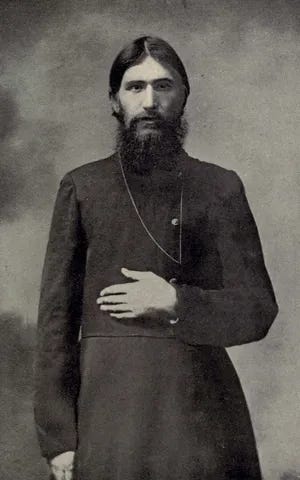Ra-ra-Rasputin
Lover of the Russian queen
There was a cat that really was gone
Ra-ra-Rasputin
Russia's greatest love machine
It was a shame how he carried on…
Ahhh… Rasputin by Bonny M is a catchy yet surprisingly historically accurate song about one of Russia’s most mythologized figures.
Regardless of what you actually know about Rasputin, I’m sure everyone has at least heard of the man before– the peasant who transformed himself into a mystic and later became one the most trusted advisors to the Tsar of Russia. He was, by all accounts, quite an accomplished fellow.
When it comes to charismatic figures like Rasputin, one cannot help but wonder if they were always like that. Unfortunately, there is very little factual information available about his early childhood. We can only conjecture that he grew up like any other peasant child born in a small Russian village (Pokrovskoye) to an ordinary peasant family.
We get more insight into him as a character when he enters his late 20s. Historians (who know more about this subject than I do) believe that Rasputin began to have a bit of a religious crisis during this time and so set out on a holy pilgrimage to learn more about the scriptures, God, and man's place in the world. He was not an anomaly, as the late 19th and early 20th century Russia was marked by an attitude of seeking with young men, like Rasputin, wandering in search of God and enlightenment.
What sets Rasputin apart, therefore, can only come down to qualities we associate with charismatic leaders. A sort of electric energy and magnetism that could not be denied by either his followers or his detractors. We don’t know whether his charisma was ever-present or cultivated over time, but charismatic he must have been to have gathered the following that he did.
In 1905, Rasputin was introduced to the Royal family of Russia, the Romanovs– more specifically, Nicholas the Second and his Empress Consort Alexandra. The relationship between the Royal family and Rasputin was quite exemplary simply because royalty rarely ever stepped outside their palaces, let alone mingle with “the people”. The fear of assassination was so great that they deliberately cut themselves off from everyone and anyone. Even members of the aristocracy were rarely allowed to engage with them directly either– a point of contention that comes into play later on. This begs the question, “Why make an exception for Rasputin?”
Well… the problem with living in a gilded cage during a time of political turmoil is that you are so far removed from your citizens that you have no idea what the right course of action is. Then, in comes a man who has spent years of his life roaming across the breadth of your empire and mingling with all the different social classes it has to offer… of course, you would look to him as a saving grace. Rasputin gave the Romanovs the illusion of having a profound connection with their people without ever having to actually engage with them, which is why they often asked for and headed his advice when it came to matters of policy and reform.
This is probably the time to mention Rasputin’s staunch monarchist ideology, which meant he did not often give them the most politically savvy advice (considering the Russian populace was out for blood and revolution was on the mind). That is not to say he always gave them bad advice. In fact, there are records of Rasputin urging Nicholas against listening to the warmongers and entering the war in 1914. One can only imagine what the world or Russia would have looked like had Nicholas headed Rasputin’s warnings of blood, death, and the end of Russia as they knew it.
Unfortunately, Rasputin’s closeness with the Royal family was a source of great jealousy amongst the aristocracy, who took it upon themselves to start spreading rumours– namely regarding an alleged affair between Empress Alexandra and Rasputin, who was known by that time to be quite the womanizer. Honestly, womanizer is not the right term to use. Despite having a wife and child, Rasputin was a lech and a creep when it came to women. Regardless, the rumours spread across Russia, undercutting the Romanovs' image and power.
His death in 1916 has been exaggerated and embellished beyond belief. What’s even more interesting is that his assassin, Prince Feliks Yusupov, actually published a memoir detailing how he killed the "Mad Monk". Now of course, a lot is said about him surviving a poisoning and then two bullets to mid-section before he died by drowning in the river, but a more objective examination of his body would lead one to believe that it was a bullet to the forehead that finally did it. The reason behind his assassination is also quite ridiculous in many ways. These conservatives believed that Russia’s repeated defeats in the war were due to a mole. Since the empress was German by birth, they thought Alexandra (and her alleged lover Rasputin) were the spies feeding the German Kaiser inside information. So the obvious solution was to kill Rasputin, sending the empress into a spiral of depression, allowing her to be removed from the palace, freeing Nicholas from their influence, and empowering him to take control again. As I said, they certainly jumped from one inconclusive assumption to another. Not that it makes much of a difference, as the Romanovs were dethroned shortly after.
So yeah. Rasputin… Russia’s greatest love machine, indeed.
PS: Did you know his penis was allegedly removed from his person after his assassination in 1916 and subsequently pickled and kept in a jar? No? Well… the more the you know. Right?






